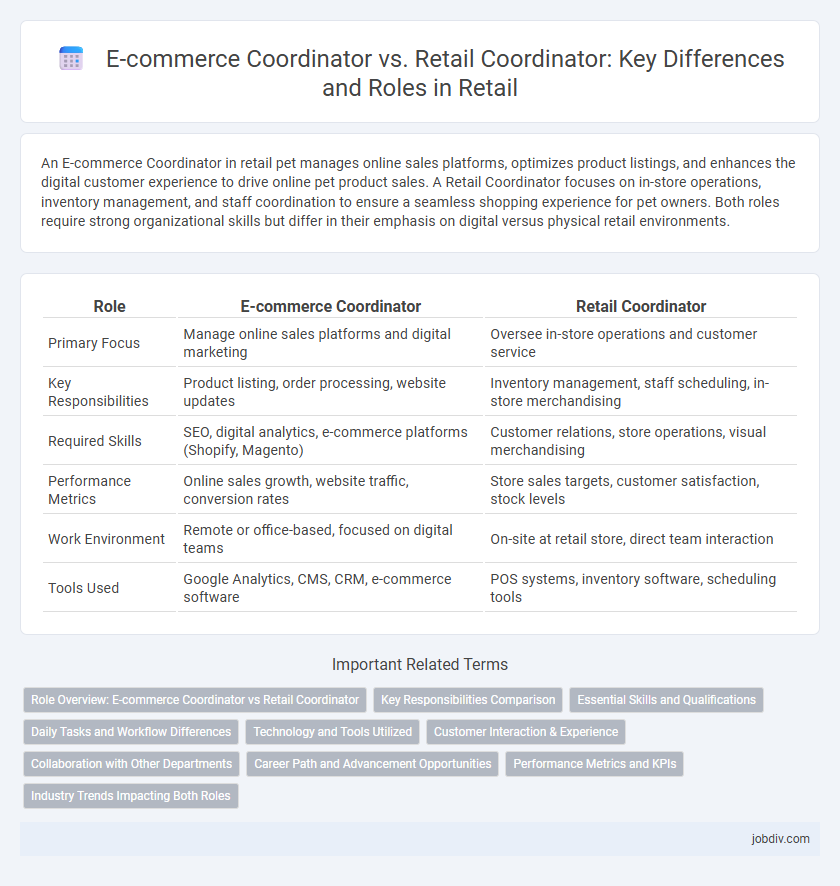An E-commerce Coordinator in retail pet manages online sales platforms, optimizes product listings, and enhances the digital customer experience to drive online pet product sales. A Retail Coordinator focuses on in-store operations, inventory management, and staff coordination to ensure a seamless shopping experience for pet owners. Both roles require strong organizational skills but differ in their emphasis on digital versus physical retail environments.
Table of Comparison
| Role | E-commerce Coordinator | Retail Coordinator |
|---|---|---|
| Primary Focus | Manage online sales platforms and digital marketing | Oversee in-store operations and customer service |
| Key Responsibilities | Product listing, order processing, website updates | Inventory management, staff scheduling, in-store merchandising |
| Required Skills | SEO, digital analytics, e-commerce platforms (Shopify, Magento) | Customer relations, store operations, visual merchandising |
| Performance Metrics | Online sales growth, website traffic, conversion rates | Store sales targets, customer satisfaction, stock levels |
| Work Environment | Remote or office-based, focused on digital teams | On-site at retail store, direct team interaction |
| Tools Used | Google Analytics, CMS, CRM, e-commerce software | POS systems, inventory software, scheduling tools |
Role Overview: E-commerce Coordinator vs Retail Coordinator
An E-commerce Coordinator manages online sales platforms, optimizing product listings, coordinating digital marketing campaigns, and ensuring seamless customer experience across e-commerce sites. A Retail Coordinator oversees in-store operations, including inventory management, merchandise displays, and support for retail staff to drive sales and enhance customer service. Both roles require strong organizational skills but focus on distinct channels: digital environments for E-commerce Coordinators and physical retail spaces for Retail Coordinators.
Key Responsibilities Comparison
E-commerce Coordinators manage online sales platforms, focusing on website content updates, digital marketing campaigns, and order fulfillment processes, ensuring seamless customer experiences and maximizing online revenue. Retail Coordinators oversee in-store operations, including inventory management, staff scheduling, and merchandising displays to optimize physical store performance and customer satisfaction. Both roles require coordination skills, but E-commerce Coordinators prioritize digital sales strategies while Retail Coordinators focus on brick-and-mortar store efficiency.
Essential Skills and Qualifications
E-commerce Coordinators excel in digital marketing, SEO optimization, and data analytics, ensuring seamless online sales operations and enhanced customer experiences through platforms like Shopify or Magento. Retail Coordinators prioritize inventory management, visual merchandising, and staff scheduling to optimize in-store performance and customer service in physical retail environments. Both roles demand strong communication, problem-solving abilities, and proficiency in sales analysis, but their focus diverges between digital commerce strategies and brick-and-mortar retail management.
Daily Tasks and Workflow Differences
E-commerce Coordinators primarily manage online sales platforms, focusing on website updates, digital marketing campaigns, inventory synchronization, and customer service via online channels. Retail Coordinators concentrate on in-store operations, including staff scheduling, visual merchandising, stock replenishment, and coordinating sales promotions within physical locations. The workflow of an E-commerce Coordinator revolves around real-time digital analytics and online customer interactions, whereas Retail Coordinators handle direct on-site logistics and customer engagement activities.
Technology and Tools Utilized
E-commerce Coordinators leverage advanced digital platforms such as Shopify, Magento, and Google Analytics to optimize online store performance, manage product listings, and track customer behavior. Retail Coordinators utilize point-of-sale (POS) systems, inventory management software like Square or Lightspeed, and workforce scheduling tools to streamline in-store operations and enhance customer service. Both roles require proficiency in data analysis and technology integration, but E-commerce Coordinators prioritize e-commerce platforms and online marketing tools, while Retail Coordinators focus on in-person sales technologies and store logistics systems.
Customer Interaction & Experience
E-commerce Coordinators manage online customer interactions by optimizing digital touchpoints, including website usability, online chat support, and personalized email campaigns, to enhance the virtual shopping experience. Retail Coordinators focus on in-store customer service, ensuring product availability, store layout, and staff engagement create a seamless and satisfying physical shopping environment. Both roles aim to elevate customer experience but differ in their approach to interaction channels and customer engagement strategies.
Collaboration with Other Departments
E-commerce Coordinators work closely with marketing, logistics, and IT teams to optimize online sales channels and ensure seamless digital customer experiences. Retail Coordinators collaborate primarily with store managers, visual merchandisers, and inventory teams to enhance in-store operations and customer engagement. Both roles require strong cross-departmental communication to align strategies and achieve overall retail business objectives.
Career Path and Advancement Opportunities
E-commerce Coordinators specialize in managing online sales platforms, digital marketing strategies, and data analytics, offering career advancement toward roles such as E-commerce Manager or Digital Marketing Director. Retail Coordinators focus on in-store operations, inventory control, and customer service management, typically progressing to Store Manager or Regional Retail Manager positions. Both paths provide distinct growth opportunities, with e-commerce roles increasingly valued due to the rise of online shopping trends.
Performance Metrics and KPIs
E-commerce Coordinators primarily track online conversion rates, average order value, and cart abandonment rates to optimize digital sales performance. Retail Coordinators focus on foot traffic, in-store sales volume, and inventory turnover to improve physical store operations. Both roles utilize customer satisfaction scores and sales growth metrics but apply them within distinct channels to drive revenue and operational efficiency.
Industry Trends Impacting Both Roles
E-commerce Coordinators increasingly leverage advanced analytics and AI-driven personalization tools to enhance online customer experiences, reflecting the rise of omnichannel retail strategies. Retail Coordinators adapt to trends like contactless payments and in-store digital kiosks, optimizing physical store operations to meet evolving consumer expectations. Both roles require agility in integrating emerging technologies with traditional retail practices to drive sales and customer engagement.
E-commerce Coordinator vs Retail Coordinator Infographic

 jobdiv.com
jobdiv.com